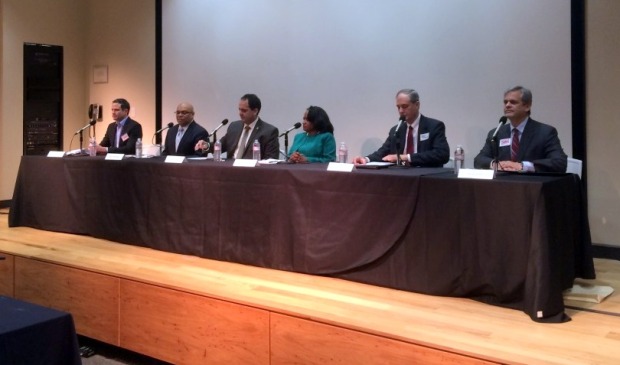Mayor candidates’ spar on achieving affordability
Thursday, October 16, 2014 by
Tyler Whitson Affordability topped the list of issues that Austin mayoral candidates Sheryl Cole, Mike Martinez, Steve Adler, Todd Phelps, Randall Stephens and David Orshalick discussed at Wednesday’s Ballot Boxing Mayoral Forum.
Moderators Nathan Bernier of KUT, Shannon Wolfson of KXAN and Michael Kanin of the Austin Monitor covered a broad array of topics. They included how to address low water levels in lakes Travis and Buchanan, how to fix the city’s transportation problems regardless of whether or not Proposition 1 passes, and what to do to address the fact that the city’s African-American population is shrinking.
Moderators pulled some of their questions from listeners following at home via Twitter.
Candidates used Bernier’s question about what the next mayor might do to change property taxes as an opportunity to discuss affordability for residents.
Orshalick, a retired tech worker, said that he supports cutting all property taxes for the city and all taxing authorities by at least 20 percent. He said that increasing the city’s operational efficiency through better management tools would be the way to accomplish this.
“We have way too much demand for housing and way too little supply of available housing,” Orshalick said. “We need to reverse that. We need to stop outside recruitment and we need a massive housing boom in Austin.”
Adler, an attorney who has practiced civil rights and worked as chief of staff and general counsel for state Senator Eliot Shapleigh (D-El Paso), touted a 20 percent homestead tax exemption — the maximum that the state allows — as a tool for increasing affordability. “It is not something that just helps the rich, it helps the people who need it most,” he asserted.
Adler said that the property tax burden for those in the bottom 20 percent of household income is four times greater than the top 1 percent. He proposed that the city pay for it out of budget surpluses or by adjusting the tax rate.
Phelps, a musician and business owner, said that he would not only support the homestead exemption, but would like to see it enacted immediately. He also referred to not supporting Proposition 1 as a tool for increasing affordability.
Proposition 1 is a bond proposal that will ask city voters on the November election ballot to allocate $1 billion for a transportation project that includes a $400 million for a package of roadway improvements and $600 million for the construction of a new urban rail line.
Phelps said he would call for an audit of the city budget and work with the state to try to expand tax exemptions similar to the homestead exemption to multifamily and rental properties “so that these types of heavy taxes are not passed along to the people that they hurt the most.”
Martinez, a former Austin firefighter who was first elected to City Council in 2006, referred indirectly to the homestead property tax exemption when he criticized “proposals that automatically, disproportionately have a rise in cost of living in Austin for 55 percent of the population.” He said that policymakers should continue to “hold the line” during budget deliberations by cutting unnecessary programs.
Martinez noted that Council was able to lower the tax rate this year, adding that bills went up because of other taxing entities and property appraisal increases. He proposed working with the legislature to “levelize the property tax appraisal system that is causing this major affordability crisis in Austin.”
Stephens, an airline mechanic, said before making any major decisions or capital improvements, policymakers should carefully examine the project, determine who would benefit from it and make sure that “every minority in this community is getting their fair share of their tax dollar for the infrastructure in their neighborhoods.”
Stephens said that, if elected, he would talk with the city manager and request that each department head provide a plan to reduce his or her budget by 5 percent over the coming year. “The ones that stick to the plan — that succeed — will have the best chance of retaining their jobs,” he said.
Cole, a former accountant and attorney who currently serves as Mayor Pro Tem and was first elected to City Council in 2006, said that it is very important for policymakers to show the city that they can live within its means. “There’s no firmer way that we can do that than with our property tax rate,” she said.
Cole said that, as mayor, she would determine and pursue ways for the city to work with the appraisal district. She proposed hiring an expert who would “fight about the disproportionate values between commercial property and residential property.”
The event was the last in a free election forum series that the Austin Monitor, KUT, the Austin Chronicle, KXAN and Univision presented.
Early voting begins Monday and the general election will take place Nov. 4. All voters registered in the City of Austin are eligible to vote for Mayor.
You're a community leader
And we’re honored you look to us for serious, in-depth news. You know a strong community needs local and dedicated watchdog reporting. We’re here for you and that won’t change. Now will you take the powerful next step and support our nonprofit news organization?









